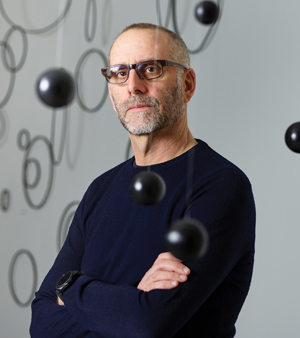Morris Adjmi’s office sometimes feels more like an art gallery than an architecture firm.
That’s because Adjmi, 57, regularly displays works from a rotating parade of local and international artists. The firm hosts gallery openings for the installations, but the art also sometimes serves as a source of inspiration. “Typically, I like to look at our work as something that’s influenced by the site and then overlay that with some other artistic inspiration,” he said. Adjmi — a New Orleans native who lives in the West Village with his wife and three sons — got his start working for Pritzker Prize-winning architect Aldo Rossi in Milan in 1981. Six years later the two opened a New York office. And following Rossi’s 1997 death, Adjmi founded his eponymous firm, Morris Adjmi Architects, which now has 25 completed projects to its name and another 22 under construction. The 70-plus-person firm, which is based on the 32nd floor of 60 Broad Street in the Financial District, does both interior and exterior design and has worked with major developers including Kushner Companies, Savanna and Thor Equities. Some of its recent high-profile projects include the Samsung building in the Meatpacking District, the Austin Nichols House and 465 Pacific Street in Brooklyn.
 Plumbing fixtures
Plumbing fixtures
Adjmi, a devoted flea-market patron, regularly travels to New Milford, Connecticut, to scout out antiques and eccentric knickknacks. He picked out this antique plumbing fixture, among others, as inspiration for pieces he designed for AF New York, which sells luxury kitchen and bathroom fixtures. His oldest son, Emmett, will often join his father on these trips, searching for old computers, cameras or cassettes.
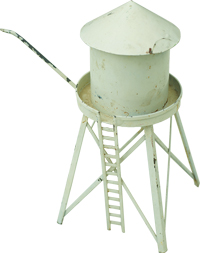 Tin water tower
Tin water tower
A miniature tin water tower is another flea-market find. To Adjmi, some of the city’s most iconic architecture can be seen on buildings’ roofs. At his old office in the Flatiron District, he kept a close eye on one nearby water tower in particular. “There was always some drama — like the ice was forming on it or the roof fell in and they came and fixed it,” he said. “It’s really a signature element in the skyline.”
 Caran d’Ache pencils
Caran d’Ache pencils
Everyone at Adjmi’s office uses these Swiss mechanical pencils. For Adjmi, there’s a certain comfort in using the same tools every day. “I probably shouldn’t admit this, but the one thing that attracted me to architecture was all the drawing tools,” he said. “Mechanical pencils and T-squares, and all those things, which are all sort of history now because you don’t really use those, but I think there is something nice about hand- drawing.”
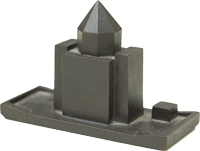 Teatro del Mondo
Teatro del Mondo
One of Adjmi’s favorite works by Rossi was the Teatro del Mondo, a floating theater in Venice, Italy. Rossi, who knew how fond his former student was of the project, gave him a cast metal sculpture of the theater in the early 1980s. “I always thought it was a special gift,” he said. “It reminds me of the time spent working with him.”
![]() Silicone cubes
Silicone cubes
These colorful silicone cubes are by Sweden’s Matthias van Arkel, one of many artists whose work has been on display in Adjmi’s office. “I think there are so many great artists working, and that’s a great place to mine ideas,” Adjmi said, describing his own creative process.
Porsche 911
 In sixth grade, Adjmi’s teacher drove him and a few other students to the New Orleans Museum of Art in her Porsche 911. He remembers the day vividly — the rush of not being in school and the wind on his face as he sat in the convertible’s backseat. “She was this really wild spirit,” he said, noting that it was one of the first times he thought of art as an experience. “If I think back, that’s when my fascination with art started.” What he remembers the most, however, was a giant art installation — a yellow, inflatable building that patrons could walk through — in the museum’s lobby that he equated to “an Egyptian tomb.”
In sixth grade, Adjmi’s teacher drove him and a few other students to the New Orleans Museum of Art in her Porsche 911. He remembers the day vividly — the rush of not being in school and the wind on his face as he sat in the convertible’s backseat. “She was this really wild spirit,” he said, noting that it was one of the first times he thought of art as an experience. “If I think back, that’s when my fascination with art started.” What he remembers the most, however, was a giant art installation — a yellow, inflatable building that patrons could walk through — in the museum’s lobby that he equated to “an Egyptian tomb.”
 Freddy the fed
Freddy the fed
Two of the firm’s architects working on a project in Little Italy gave Adjmi a set of plastic figurines depicting a fictional Italian family, the Palermos. The project is a condo building on Mulberry Street that is also home to the Italian American Museum. His favorite is “Freddy the Fed,” a particularly nosey plastic figurine holding binoculars.
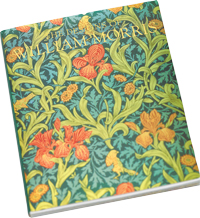 William Morris design book
William Morris design book
For terra cotta details on the façade of 207 West 79th Street — a 19-unit, under-construction condo the firm designed for Anbau Enterprises — Adjmi turned to a master of patterns: 19th-century English designer William Morris. He found a design in the book to create a new pattern for the prewar-inspired building. Even more recently, he turned to the book for inspiration to redecorate the firm’s bathroom.
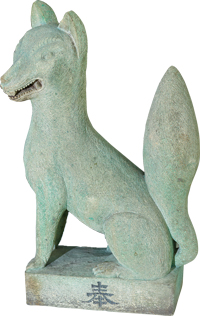 Fox statue
Fox statue
While working on a project in Tokyo, Adjmi made the mistake of expressing passing interest in a fox statue to his client. “I literally said, ‘Oh, that’s great.’ The next thing I know, it’s in my office,” he said. “You have to be careful what you say. We were constantly being flooded with gifts.”
Correction: An earlier version of this story misidentified the origin of the Caran d’Ache pencils. They are Swiss.
